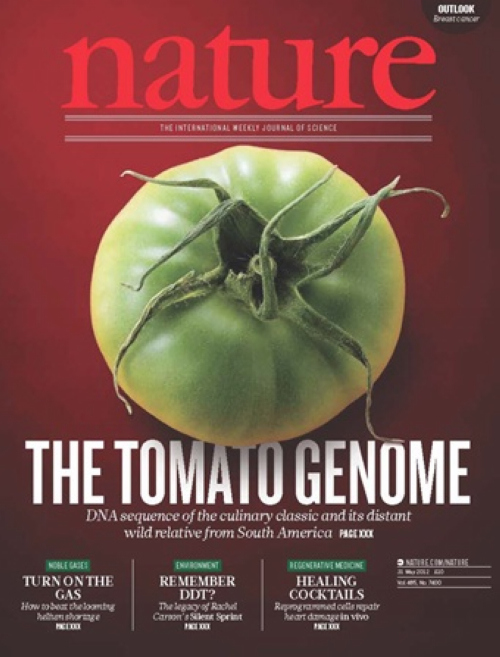|
The Tomato Genome Consortium (TGC), a group of over 300 scientists from fourteencountries, has sequenced the genomes of the domesticated tomato and its wild ancestor, Solanum pimpinellifolium. This achievement, which was published as a cover story in the May 31 issue of the journal Nature, is expected to lower costs and speed up efforts to improve the world-wide tomato production, making it better equipped to combat the pests, pathogens, drought and diseases that now plague growers. The work may also speed up improvements inother crops.
China contributed sequencing chromosome 3 and 11, two of the tomato’s 12 chromosomes. The chromosome 3 team was led by professors Chuanyou Li and Yongbiao Xue from the Institute of Genetics & Developmental Biology (IGDB), Chinese Academy of Sciences. Thirty-four scientists from 8 institutions contributed the chromosome 3 sequencing effort. The Chromosome 11 team was led by professors Sanwen Huang and Yongchen Du from the Institute of flowers and vegetables, Chinese Academy of Agricultural Sciences. Twenty-two scientists from 7 institutions contributed the chromosome 11 sequencing effort.
Together, the sequences provide the most detailed look at the functional portions of the tomato genome, revealing the order, orientation, types and relative positions of its 35,000 genes. Tomato is a member of the Solanaceae or nightshade family, and the new sequences are expected to provide reference points helpful for identifying important genes in tomato’s relatives. The group mainly including potato, pepper, eggplant and petunia, is the world’s most important vegetable plant family in terms of both economic value and production volume. The availability of tomato genome sequence will not only serve as a reference for other Solanaceous species but also help in comparative genomics among diverse taxa.
TGC was established as a result of a scientific conference organized in 2003in Washington, DC.Consortium members include scientists from Argentina, Belgium, China,France, Germany, India, Israel,Italy,Japan, Korea,Spain, the Netherlands, the United Kingdom and the United States. The genome sequence and related resources can be accessed at the Solgenomics website (http://solgenomics.net) and at http://mips.helmholtz-muenchen.de/plant/tomato/index.jsp

|



